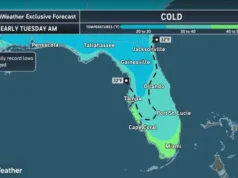
As the government shutdown stretches into its third week, an estimated 750,000 furloughed federal workers are scrambling to make ends meet.
When the government shuts down, workers who are classified as “nonessential” are ordered to stay home without pay. When the government reopens, federal law states they are entitled to backpay, but bills are piling up now while their paychecks are in political limbo.
Shutdowns are “never fun or fair to the feds who serve,” says Wes Battle, a certified financial planner (CFP) at Financial Advantage Associates who specializes in working with federal employees.
Here’s what they recommend.
1. Prioritize your bills
Ideally, financial planners suggest building an emergency fund that can cover several months of expenses for situations exactly like this. But for federal workers who don’t have savings to lean on, the shutdown is especially difficult.
“When paychecks stop, the first rule is triage,” says Patrick Huey, a CFP and owner of Victory Independent Planning. “Prioritize the essentials.”
Huey encourages federal workers to focus on bills related to home and health: “Keep your roof, utilities, insurance and basic health needs at the top of the list,” he writes in an email to Money, “but cut everything nonessential.”
If it comes down to it, he says, you may want to consider deferring payments to bills that “aren’t tied to survival,” such as credit cards, student loans and streaming services.
“Any hits to your credit or cash can be repaired, but recovering from lost shelter or insurance is much harder,” Huey adds.
2. Avoid credit card debt (if possible)
With backpay on the horizon, it may be tempting for federal workers to put their normal expenses on a credit card during the shutdown. But financial advisors say to be wary of that strategy.
If you have a choice, Huey says to only pay for essentials using credit.
“Avoid racking up balances for things you don’t need right now,” he adds. “Try to limit charges so you won’t be overwhelmed by repayments.”
Battle says credit cards aren’t ideal. One alternative federal workers could tap is their Thrift Savings Plans, or TSPs.
Keep in mind, hardship withdrawals from TSPs may come with tax penalties and permanently reduce the retirement account balance. However, a TSP loan could be a smart option during a furlough, as it comes with low interest rates and no pre-pay penalty. Plus, the amount borrowed — plus the interest charged — goes back into the account once it’s repaid, Battle says.
“Nobody knows how long the shutdown will last or if the ones furloughed are even going to have a job when this is over,” adds Bill Shafransky, a senior wealth advisor at Moneco Advisors. “What you don’t want is a balance on a credit card that is compounding with interest and with no way to pay it back.”
Shafransky’s advice underscores the added uncertainty of this shutdown, as the Trump administration has attempted firing — not just furloughing — some federal workers. (A judge has issued a temporary halt to any reductions in force.) President Donald Trump has suggested some federal workers don’t deserve their backpay, despite law that guarantees their lost wages while the government is closed.
Huey recommends federal workers contact their major creditors to let them know about the furlough — especially landlords or mortgage lenders.
“Get ahead of the problem by proactively calling every biller and lender, even before you miss a payment,” he says, noting that this could open up short-term relief options like flexibility with payments.
Some lenders may even have benefits for federal workers that keep missed payments during a government shutdown from dinging your credit, he says.
PNC customers can request a freeze in credit reporting, for instance, and Lubbock National Bank says it will waive fees and not report missed payments on its mortgages. According to the American Bankers Association, about two dozen banks are offering similar assistance to furloughed federal workers.
Experts also recommend tapping community organizations for assistance. One option to quickly scan what’s available nearby is the My Fed Benefits tool, which aggregates known financial assistance programs for federal workers based on location. It shows discounts at local restaurants and entertainment options for furloughed federal workers.
Disclaimer
Artificial Intelligence Disclosure & Legal Disclaimer
AI Content Policy.
To provide our readers with timely and comprehensive coverage, South Florida Reporter uses artificial intelligence (AI) to assist in producing certain articles and visual content.
Articles: AI may be used to assist in research, structural drafting, or data analysis. All AI-assisted text is reviewed and edited by our team to ensure accuracy and adherence to our editorial standards.
Images: Any imagery generated or significantly altered by AI is clearly marked with a disclaimer or watermark to distinguish it from traditional photography or editorial illustrations.
General Disclaimer
The information contained in South Florida Reporter is for general information purposes only.
South Florida Reporter assumes no responsibility for errors or omissions in the contents of the Service. In no event shall South Florida Reporter be liable for any special, direct, indirect, consequential, or incidental damages or any damages whatsoever, whether in an action of contract, negligence or other tort, arising out of or in connection with the use of the Service or the contents of the Service.
The Company reserves the right to make additions, deletions, or modifications to the contents of the Service at any time without prior notice. The Company does not warrant that the Service is free of viruses or other harmful components.












